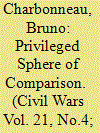| Srl | Item |
| 1 |
ID:
167059


|
|
|
|
|
| Summary/Abstract |
The defence and foreign policy communities in the Global South should learn from the lessons of security governance that followed the 13-year United Nations Stabilization Mission in Haiti (MINUSTAH). To better inform the academic and policy debate, this article extrapolates ideas from the case study of Chile, one of the ‘big four’ Latin American peacekeeping providers in Haiti, along with Argentina, Brazil and Uruguay. The article examines Chile’s finished compromise with the MINUSTAH in order to shed light on conflict intervention strategies and its peace operations in Colombia and the Central African Republic. It argues that military policies for peace intervention purposes should undergo a critical reassessment in light of the state steering away from the past use of long-term brute force. Today’s changing security environment favours a set of different human security policies that have become more prevalent for peacekeeping policymaking. Engaging in scenarios of war and peace thus demands a more focused, experienced and tactical use of military and diplomatic resources than governments in the developing countries currently possess.
|
|
|
|
|
|
|
|
|
|
|
|
|
|
|
|
| 2 |
ID:
120881


|
|
|
|
|
| Publication |
2013.
|
| Summary/Abstract |
The overexpansion of alliance portfolios can diminish the overall security of states. Due to the fear of abandonment, states have an interest in expanding the size and capabilities of their alliance portfolio to ensure the receipt of adequate assistance in the event of a conflict. However, each ally's incentive to intervene-their expected reward-decreases as alliance portfolios become larger and more powerful. In such situations, states' efforts to address the alliance abandonment problem may serve to exacerbate it. Hypotheses regarding the influence of alliance portfolio size and capabilities on conflict intervention are tested. Analysis suggests that states must possess some minimal threshold of military capability before an expanded alliance portfolio increases the likelihood of intervention in conflict. Furthermore, states must be mindful of their individual capabilities relative to those of their collective alliance portfolio. States appear capable of adding roughly 1.5 times their own capability through alliances before additional expansion actually decreases the probability of intervention.
|
|
|
|
|
|
|
|
|
|
|
|
|
|
|
|
| 3 |
ID:
169942


|
|
|
|
|
| Summary/Abstract |
Comparison is a method that cannot avoid that its concepts are approximations made for specific audiences or purposes. Deployed to compare armed conflicts, it naturalises the state as the central unit of analysis and the intervention as the external context. This article proposes a strategy that reveals the colonial legacies that form or perform the units of analysis. The possibility of comparing Côte d’Ivoire and Mali appears only when one considers a prior comparison: between Francophone Africa and other ‘worlds’. The construction of a French privileged sphere of intervention is inextricably tied to establishing a privileged sphere of comparison.
|
|
|
|
|
|
|
|
|
|
|
|
|
|
|
|